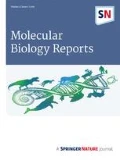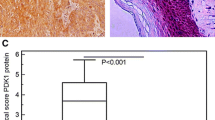Abstract
The p38 mitogen-activated protein kinase (MAPK) is a member of the MAPK family, which is initially found to be activated by stress stimuli, proinflammatory cytokines, and growth factors. However, its role in the pathogenesis of esophageal squamous cell carcinoma (ESCC) is largely unkown, so we investigate the role of phosphorylated p38 (p-p38) MAPK in ESCC. First of all, in vitro cell line ECa109, SB203580 as selective inhibitor of p38, can suppress the growth of esophageal cancer cell in a dose- and time-dependent way, suggesting that ECa109 cell growth and proliferation was closely associated with p-p38. Using western-blot analysis of fresh 16 paired surgically resected ESCC and matched non-tumor adjacent tissues (NAT), we showed that p-p38 was significantly expressed higher in NAT compared to ESCC. Moreover, expressions of p-p38 were further confirmed by 162 paired of formalin-fixed paraffin-embedded (FFPE) ESCC and NAT by immunohistochemistry, the same trend result was obtained through statistical analysis that there was increased expression of p-p38 in NAT as compared with ESCC (P < 0.01), and expression of p-p38 was not significantly associated with lymph nodes metastasis (P > 0.05) and ESCC differentiation degree (P > 0.05). Taken together, all the results we obtained demonstrated that p-p38 plays a key role in the malignant transformation of ESCC.




Similar content being viewed by others
References
Enzinger PC, Mayer RJ (2003) Esophageal cancer. N Engl J Med 349:2241–2252
Lambert R, Hainaut P (2007) The multidisciplinary management of gastrointestinal cancer. Epidemiology of oesophagogastric cancer. Best Pract Res Clin Gastroenterol 21:921–945
Zheng S, Vuitton L, Sheyhidin I, Vuitton DA, Zhang Y, Lu X (2010) Northwestern China: a place to learn more on oesophageal cancer: part one: behaviour, environmental risk factors. Eur J Gastroenterol Hepatol 22(8):917–925
Talback M, Stenbeck M, Rosen M et al (2003) Cancer survival in Sweden 1960–1998-developments across four decades. Acta Oncol 42:637–659
Holdenrieder S, Stieber P, Bodenmuller H, Busch M, Fertig G, Furst H et al (2001) Nucleosomes in serum of patients with benign and malignant diseases. Int J Cancer 95:114–120
Ekman S, Bergqvist M, Heldin CH, Lennartsson J (2007) Activation of growth factor receptors in esophageal cancer-implications for therapy. Oncologist 12:1165–1177
Nebreda AR, Porras A (2000) P38 MAP kinases: beyond the stress response. Trends Biochem Sci 25:257–260
Losa JH, Cobo CP, Viniegra JG, Lobo VA, Cajal SR, Prieto RS (2003) Role of p38 MAPK pathway in cisplatin-based therapy. Oncogene 22:3998–4006
Nys K, Van Laethem A, Michiels C, Rubio N, Piette JG, Garmyn M, Agostinis P (2010) A p38 (MAPK)/HIF-a pathway initiated by UVB irradiation is required to induce Noxa and apoptosis of human keratinocytes. J Invest Dermatol 130:2269–2276
Bulavin DV, Saito S, Hollander MC, Sakaguchi K, Anderson CW, Appella E, Fornace AJ Jr (1999) Phosphorylation of human p53 by p38 kinase coordinates N-terminal phosphorylation and apoptosis in response to UV radiation. EMBO J 23:6845–6854
Tanaka Y, Gavrielides MV, Mitsuuchi Y, Fujii T, Kazanietz MG (2003) Protein kinase C promotes apoptosis in LNCaP prostate cancer cells through activation p38 MAPK and inhibition of the Akt survival pathway. J Biol Chem 278:33753–33762
Hou ST, Xie X, Baggley A, Park DS, Chen G, Walker T (2002) Activation of the Rb/E2F1 pathway by the nonproliferative p38 MAPK during Fas (APO1/CD95)-mediated neuronal apoptosis. J Biol Chem 277:48764–48770
Torcia M, Chiara G, Nencioni L, Ammendola S, Labardi D, Lucibello M et al (2001) Nerve growth factor inhibits apoptosis in memory B lymphocytes via inactivation of p38 MAPK, prevention of Bcl-2 phosphorylation, and cytochrome c release. J Biol Chem 276:39027–39036
Recio JA, Merlino G (2002) Hepatocyte growth factor/scatter factor activates proliferation in melanoma cells through p38 MAPK, ATF-2 and cyclin D1. Oncogene 21:1000–1008
Park JI, Lee MG, Cho K, Park BJ, Chae KS, Byun DS, Ryu BK, Park YK et al (2003) Transforming growth factor-beta1 activates interleukin-6 expression in prostate cancer cells through the synergistic collaboration of the Smad2, p38-NF-κB, JNK, and Ras signaling pathways. Oncogene 22:4314–4332
Tsai PW, Shiah SG, Lin MT, Wu CW, Kuo ML (2003) Up-regulation of vascular endothelial growth factor C in breast cancer cells by heregulin-β1. A critical role of p38/nuclear factor-κB signaling pathway. J Biol Chem 278:5750–5759
Hideshima T, Akiyama M, Hayashi T, Richardson P, Schlossman R, Chauhan D, Anderson KC (2003) Targeting p38 MAPK inhibits multiple myeloma cell growth in the bone marrow milieu. Blood 101:703–705
Gauthier ML, Pickerign CR, Miller CJ et al (2005) p38 regulates cyclooxygenase-2 in human mammary epithelial cells and is activated in premalignant tissue. Cancer Res 65:1792–1799
Metka L, Ana P (2006) The role of p38 MAP kinase in cancer cell apoptosis. Radiol Oncol 40(1):51–56
Klotz R, Zeimet AG, Reimer D, Holzner EM, Chamson M, Marth C (2008) Activated p38-MAPK and gemcitabine sensitivity in recurrent ovarian cancer. Anticancer Res 28:2975–2980
Greenberg AK, Basu S, Hu J, Yie T, Wong KMT, Rom WN, Lee TC (2002) Selective p38 activation in human non-small cell lung cancer. Am J Respir Cell Mol Biol 26:558–564
Garavello W, Nicolini G, Aguzzi A, Maggioni D, Leone BE, Vigano P, Gaini RM, Tredici G (2006) Selective reduction of extracellular signal-regulated protein kinase (ERK) phosphorylation in squamous cell carcinoma of the larynx. Oncol Rep 16:479–484
Esteva FJ, Sahin AA, Smith TL, Yang Y, Pusztai L, Nahta R, Buchholz TA, Buzdar AU, Hortobagyi GN, Bacus SS (2004) Prognostic significance of phosphorylated p38 mitogen-activated protein kinase and HER-2 expression in lymph node-positive breast carcinoma. Cancer 100:499–506
Aguirre-Ghiso JA, Estrada Y, Liu D, Ossowski L (2003) ERKMAPK activity as a determinant of tumor growth and dormancy; regulation by p38SAPK. Cancer Res 63:1684–2003
Kunz M, Ibrahim S, Koczan D, Thiesen HJ, Kohler HJ, Acker T, Plate KH, Ludwig S et al (2001) Activation of c-Jun NH2-terminal kinase/stress-activated protein kinase (JNK/SAPK) is critical for hypoxia-induced apoptosis of human malignant melanoma. Cell Growth Differ 12:137–145
Estrada Y, Dong J, Ossowski L (2009) Positive crosstalk between ERK and p38 in melanoma stimulates migration and in vivo proliferation. Pigment Cell Melanoma Res 22:66–76
Acknowledgments
The project was supported by Supporting Xinjiang through Science and Technology (No. 201191157), Natural Science Foundation of China (No. 81160303 and 30860097), the First Affiliated of Xinjiang Medical University Grant (No. 2011YFY17), Xinjiang Key Laboratory of Molecular Biology and Endemic Diseases Grant (No. XJDX 0208-2010-06, XJDX 0208-2009-02) and Postgraduate Innovation Fund of Xinjiang Medical University (No. MC 2010-1).
Author information
Authors and Affiliations
Corresponding author
Additional information
Shu-tao Zheng and Chuan-shan Zhang contributed equally to this study.
Rights and permissions
About this article
Cite this article
Zheng, St., Zhang, Cs., Qin, X. et al. The status of phosphorylated p38 in esophageal squamous cell carcinoma. Mol Biol Rep 39, 5315–5321 (2012). https://doi.org/10.1007/s11033-011-1330-0
Received:
Accepted:
Published:
Issue Date:
DOI: https://doi.org/10.1007/s11033-011-1330-0




